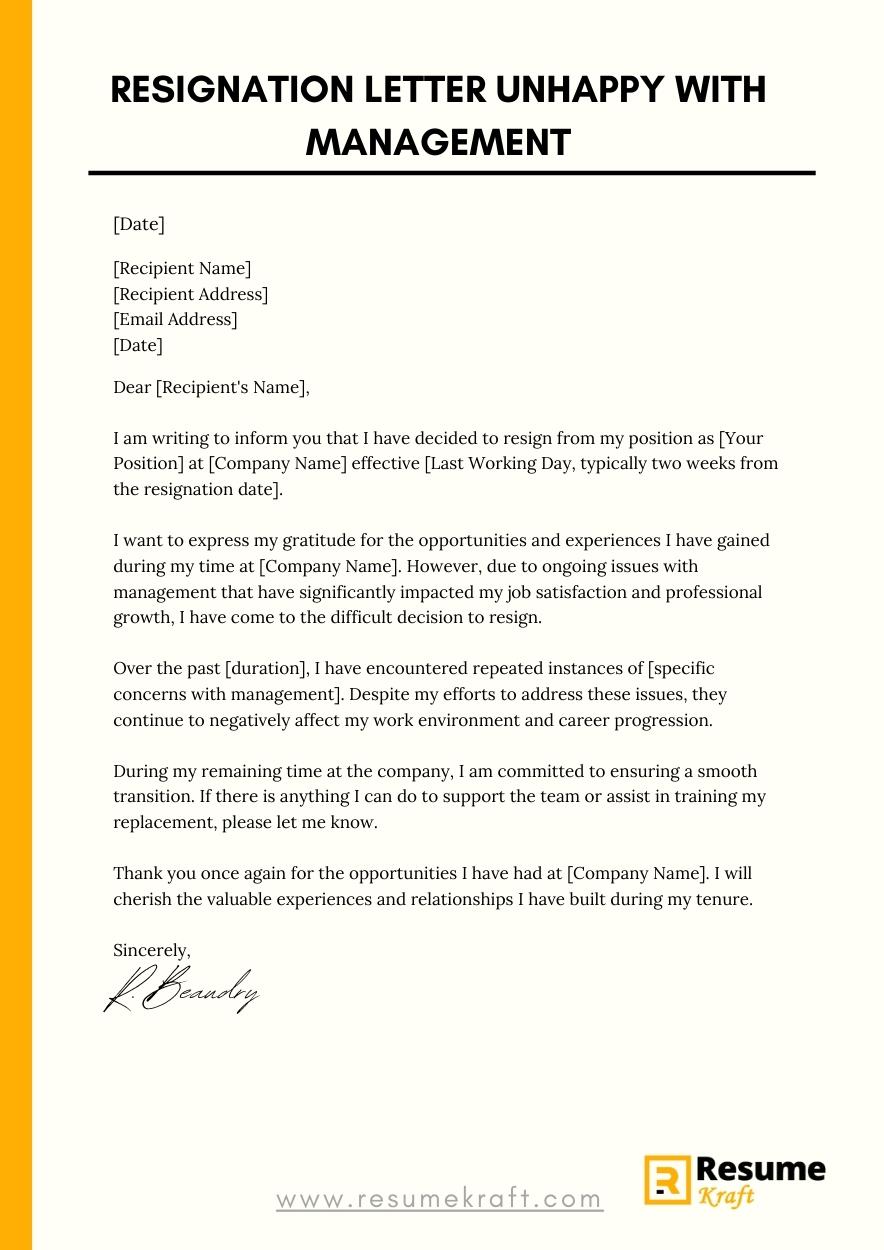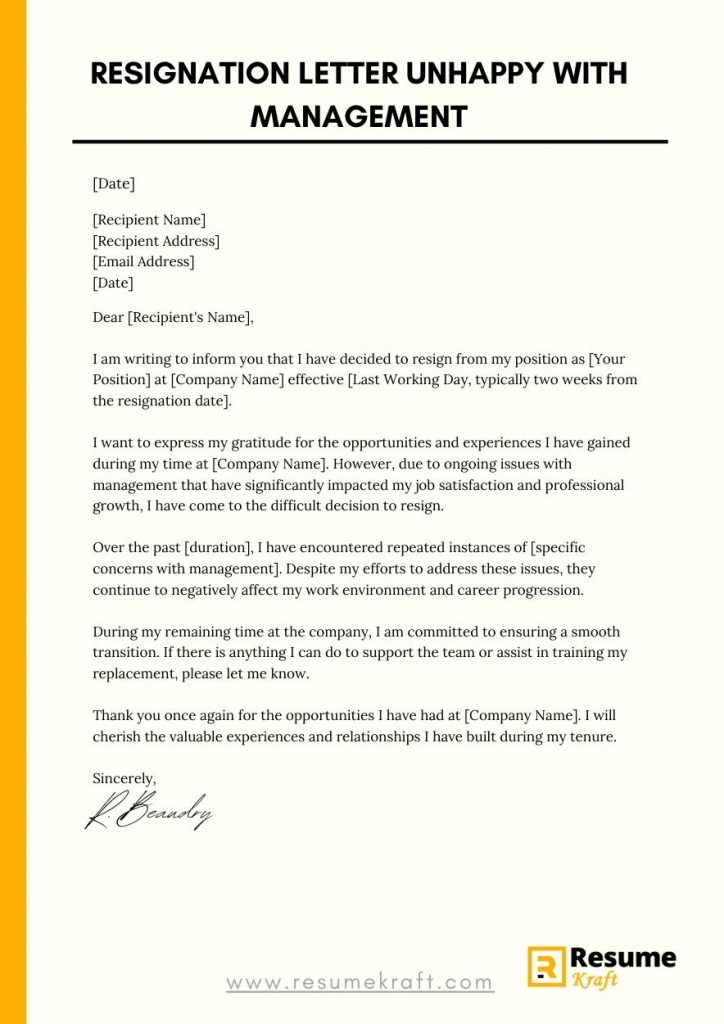
Are you considering leaving your job due to your dissatisfaction with management? Writing a resignation letter can be a challenging task, especially when you want to express your concerns but maintain professionalism. In this article, we will guide you through the process of writing a resignation letter when you are unhappy with management, providing valuable examples and tips for formatting.
What To Include in a Resignation Letter
When crafting a resignation letter, there are certain elements you should include to ensure it is professional and comprehensive. Here’s what you should consider including:
- Proper Salutation: Begin your resignation letter by addressing it to your immediate supervisor or the appropriate person in management.
- Clear Statement of Resignation: Clearly state your intention to resign from your position and specify the last day you will be working. This will help your employer plan for your departure.
- Express Your Concerns: In a professional and concise manner, express your dissatisfaction with management. Focus on the issues that have prompted your decision to resign.
- Offer Constructive Feedback: Provide specific examples, if possible, to illustrate your concerns. However, be cautious not to become overly negative or personal in your feedback.
- Express Gratitude: Use this opportunity to express your gratitude for the opportunities and experiences you gained while working for the company.
- Offer Assistance: If you are willing and able to help with the transition or training your replacement, make it known in your resignation letter.
What Not to Include in Your Resignation Letter
While it’s important to express your concerns, it is equally vital to avoid including certain elements in your resignation letter. Here are a few things you should avoid:
- Excessive Criticism: While it is important to provide constructive feedback, avoid excessive criticism or personal attacks. Maintain a professional tone throughout the letter.
- Blame Game: Refrain from blaming specific individuals or pointing fingers at anyone. Instead, focus on the overarching issues and how they have impacted your decision.
- Emotional Language: Keep your emotions in check and avoid using emotional or inflammatory language in your resignation letter. Stick to factual information and maintain a respectful tone.
- Confidential Information: Do not disclose any confidential or sensitive information in your resignation letter. This includes company trade secrets, client details, or any proprietary information.
How To Format a Resignation Letter
Proper formatting is crucial for a resignation letter as it reflects your professionalism. Follow these tips for formatting your resignation letter:
- Use a Professional Tone: Maintain a formal and business-like tone throughout the letter. Avoid using casual language or slang.
- Keep It Concise: While it is important to provide necessary details, keep your resignation letter concise and to the point. Aim for a length of one to two pages.
- Use Clear and Readable Fonts: Opt for a professional font such as Arial, Calibri, or Times New Roman. Use a font size between 10 and 12 points to ensure readability.
- Include Contact Information: Provide your contact information, including your phone number and email address, so your employer can reach you during the transition period.
- Proofread for Errors: Before sending your resignation letter, proofread it carefully for any grammatical or spelling errors. Ensure it is error-free and reflects your professionalism.
Resignation Letter Samples
To ease the process of writing your resignation letter when unhappy with management, here are two examples: a printed resignation letter sample and an email resignation letter example.

Printed Resignation Letter Sample
[Your Name]
[Your Address]
[City, State, Zip Code]
[Date]
[Supervisor’s Name]
[Company Name]
[Company Address]
[City, State, Zip Code]
Dear [Supervisor’s Name],
I am writing to inform you that I have decided to resign from my position as [Your Position] at [Company Name] effective [Last Working Day, typically two weeks from the resignation date].
I want to express my gratitude for the opportunities and experiences I have gained during my time at [Company Name]. However, due to ongoing issues with management that have significantly impacted my job satisfaction and professional growth, I have come to the difficult decision to resign.
Over the past [duration], I have encountered repeated instances of [specific concerns with management]. Despite my efforts to address these issues, they continue to negatively affect my work environment and career progression.
I believe a constructive and supportive management approach is essential for personal and professional development. Unfortunately, the current management style has hindered my ability to thrive in my role and contribute effectively to the organization.
During my remaining time at the company, I am committed to ensuring a smooth transition. If there is anything I can do to support the team or assist in training my replacement, please let me know.
Thank you once again for the opportunities I have had at [Company Name]. I will cherish the valuable experiences and relationships I have built during my tenure.
Yours sincerely,
[Your Name]
Email Resignation Letter Example
Subject: Resignation – [Your Name]
Dear [Supervisor’s Name],
I hope this email finds you well. I regret to inform you that I have made the decision to resign from my position as [Your Position] at [Company Name], effective [Last Working Day, typically two weeks from the resignation date].
I want to express my sincere appreciation for the opportunities presented to me during my time at [Company Name]. However, I have come to the difficult decision to resign due to ongoing issues with management that have negatively impacted my job satisfaction and professional growth.
Throughout my tenure, I have encountered recurring instances of [specific concerns with management]. Despite my attempts to address these concerns, they continue to hinder my ability to thrive in my role and contribute effectively to the organization.
I firmly believe that a constructive and supportive management approach is crucial for personal and professional development. Unfortunately, this has not been the case, and I feel it is in my best interest to seek new opportunities elsewhere.
I am committed to ensuring a smooth transition during my remaining time at the company. Please let me know if there is anything I can do to facilitate this process or support the team.
Thank you for the understanding and support. I am grateful for the experiences and relationships I have gained during my tenure at [Company Name].
Sincerely,
[Your Name]
Key Takeaways
- Writing a resignation letter when unhappy with management requires careful consideration and professionalism.
- Express your concerns in a concise and constructive manner, focusing on the issues rather than individuals.
- Maintain a professional tone throughout and avoid blaming or disclosing confidential information.
- Proper formatting and proofreading are essential for a well-crafted resignation letter.
- Offer assistance in the transition period if possible and express gratitude for the opportunities received.
Frequently Asked Questions
1. Is it necessary to mention the specific reasons for my unhappiness with management in my resignation letter?
While it is not mandatory to provide specific reasons, it can be beneficial to express your concerns in a professional and factual manner. By clearly communicating the issues you have faced with management, you provide your employer with valuable feedback. However, it is important to strike a balance between being honest and maintaining professionalism in your resignation letter.
2. Should I discuss my resignation decision with my immediate supervisor before submitting a resignation letter?
It is generally a good practice to have a conversation with your immediate supervisor before submitting your resignation letter. This allows for open communication and an opportunity to address any concerns or issues that may have contributed to your decision. Having a discussion prior to submitting your letter can also help clarify any misunderstandings or uncover potential solutions to the problems you are facing.
3. Can I rescind my resignation if management addresses my concerns?
Yes, it is possible to rescind your resignation if management addresses your concerns and you feel comfortable continuing your employment. Rescinding your resignation requires a thoughtful consideration of the changes and improvements made by management. It is crucial to evaluate whether the resolution of your concerns is sustainable and if it aligns with your long-term goals and personal well-being.
4. Should I include negative feedback about specific individuals in my resignation letter?
It is generally best to avoid naming or singling out specific individuals in your resignation letter. Instead, focus on broader issues and the impact they have had on your job satisfaction and professional growth. Keep your tone professional and avoid personal attacks, as the goal is to maintain a respectful and constructive approach in your resignation letter.
5. How long should I give as the notice period in my resignation letter?
The notice period mentioned in your resignation letter will depend on various factors such as your employment contract, company policies, and industry norms. In most cases, a two-week notice period is considered standard. However, certain roles or positions may require a longer notice period. It is important to refer to your employment contract or reach out to HR to determine the appropriate notice period for your specific situation.
Conclusion
Writing a resignation letter when unhappy with management can be a challenging task, but it is important to approach it professionally and with respect. By including relevant information, focusing on concerns rather than individuals, and maintaining a professional tone, you can effectively communicate your decision and express your gratitude. Use the provided samples as a guide to craft your own resignation letter and make a smooth transition to new opportunities.

